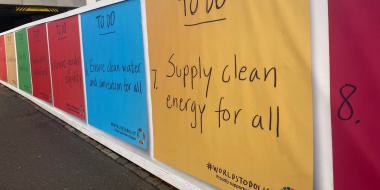Hundreds of billions of dollars each year are spent on our fragmented financial reporting system. With CDSB’s announcement that it will sunset early next year and converge to form the International Sustainability Standards Board (ISSB), it is worth reflecting upon the foundational work CDSB and the sustainability reporting community have been involved in across the years, and how a great deal of it remains relevant to the future work of the ISSB.

One of the key early reports I was involved in was the Consistency report - which was a project between the Organization for Economic Co-operation and Development (OECD), the United Nations Conference on Trade and Development (UNCTAD), the International Standards of Accounting and Reporting, and the Global Reporting Initiative (GRI). It was designed to support greater consistency of approach to the demand for and supply of corporate climate change-related information.
At the time there were no internationally agreed standards for reporting corporate climate change-related information. This absence, we know now, led to variations in methodologies, scope and boundaries of reported information, which in turn limited comparability and usefulness, leading to doubts about quality and reliability. It has also increased the cost of climate change reporting for enterprises, especially for those operating in multiple jurisdictions, and further deterred resource-constrained companies from preparing emission inventories.
The International Federation of Accountants (IFAC) reported in 2018 that the fragmented financial reporting system costs companies 780 billion US$ per year. This figure comes to mind when I consider the huge financial commitments made at COP26 and the opportunity we have to properly empower that money to get the #worldstodolist sorted. For example:
- Reaching the Sustainable Development Goal (SDG) of access to safely managed water and sanitation services by 2030 will require countries to spend $150 billion per year;
- $5 trillion will be needed annually by 2030 to finance the systemwide transformations needed to limit global warming to 1.5 degrees C; and
- Meanwhile, inequality has cost the U.S. alone nearly $23 trillion since 1990.
With the rise of the Task Force on Climate Related Financial Disclosures (TCFD), building from our own CDSB Framework, and regulators adopting the TCFD wording or the recommendations outright, we are progressing towards a globally consistent approach to financial climate reporting. The ISSB will look to build on this success and work to harmonise terminology through existing standard setters (SASB, IIRC) and across existing International Accounting Standards Board (IASB) standards. This work will form a comprehensive global baseline for investor focussed sustainability disclosure, on which jurisdictional layers can be added to support countries and regions to achieve their local sustainability-related policy priorities.
Working together
COP26 has made it apparent that the just transition won’t be cheap, and we can’t afford for business to waste money on misalignment. Consistency of approach is imperative to move capital faster to achieve a just transition to a net zero, nature positive and socially inclusive future for all.
Companies and investors need to work at the local, regional and international level to ensure all stakeholders are pushing for a consistent approach and language. Last month, 57 organisations, representing over EUR 8.5 trillion in assets and employing over 5 million people released an open letter to the European Union to act on ESG disclosure standards, encouraging the European Commission to promote a global baseline set of standards through supporting the IFRS Foundation on the launch of the ISSB.
Preparers and consumers of environmental, social and governance (ESG) data all over the world are still struggling with a profusion of reporting frameworks and standards that do not enable consistent and comparable investor focussed disclosures.
Regulators also must resist the urge to modify without rigorous intent, an unnecessary change in wording has cost implications and diverts capital from helping create a better future for all – which is what sustainability is about after all, isn’t it?
Mardi McBrien, Managing Director